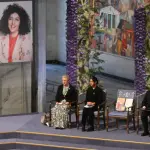(TEHRAN) — Alireza Monfared, a 20-year-old who was gay, was allegedly killed by family members, just days before he could leave Iran to seek asylum, according to multiple reports.
News of his early May death made headlines in the U.S. this week thanks in part to LGBTQ news sites and actors such as Dan Levy and singer Demi Lovato sharing the story on social media.
Some reports say Monfared was beheaded around Ahwaz, a southwestern city of Iran. Deputy police of the province confirmed that “bleeding from the neck area” was the cause of his death, Saednews reported Tuesday.
“I believe the exact term for this horrendous murder is gay-killing rather than the general term of honor-killing,” Mina Khani, an Iranian LGBTQ and women’s rights activist based in Germany, told ABC News.
“Of course the motive of such murders by family members is to defend the ‘honor’ of the tribe or family, but we should never forget the social stigma and hatred constantly reproduced by the social and legal constructs against LGBTQ members,” she added.
Many in this area of the world face enormous dangers for being openly gay. According to Human Rights Watch, nearly 15 countries in the Middle East and Northern Africa criminalize homosexuality, leading to punishments that include prison, lashes and even the death penalty. But it’s people in their local villages and communities that have many gay individuals scared.
Monfared’s friend Aghil Abyat who is based in Turkey, told BBC Persian that Monfared had told him about his step-brother’s repeated threats.
A report by 6Rang claimed Monfared had applied for an exemption from Iran’s compulsory military service. Iranian law states that men over the age of 18 need to serve in the military before they may leave the country, but homosexuality is classified under “psychological disorders,” which can lead to an exemption from service. Prior to this 2016 amendment, only transgender citizens were allowed to apply for such an exception, either before or after a gender confirmation surgery.
This government rule leaves many in the LGBTQ community there concerned for their safety.
“We were shocked and scared at the same time. We are still afraid of the regime making a database of gay and transgender people and putting them under pressure whenever they want,” Shadi Amin, an LGBTQ activist based in Germany, told ABC News.
The idea of receiving an exemption card is leaving many gay and trans Iranians worried they’d be branded and vulnerable to harassment and discrimination.
“It can be an immediate threat to gay men who receive this card,” Amin said. “The specific reason mentioned on their card can cause systematic discrimination against them. Like, they cannot get employed at state and even private organizations, or in extreme cases, it may lead to life threatening risks like what happened to Alireza.”
Mahdi, a 36-year-old Iranian gay man who did not want to use his full name over safety concerns, told ABC News that hearing the news of Monfared’s murder broke his heart.
“What makes such news even bitter is the fact that there are many of such cases happening in the country without their news going viral. And, when they go viral, it really matters what details to disclose,” he said.
“My own boyfriend was already hesitant to use gay people’s military exemption. But, when the news [became] viral, he said there is no way he’d do that because his family would realize his sexual orientation,” he explained.
Despite criticism against the Iranian government, many aren’t feeling hopeful for change. Mahdi said the Islamic Republic is not a regime that responds “logically” to any criticism.
“Besides the immediate threat that many gay exempts face now, such way of coverage and the pressure from outside of the country is not likely to have any impact on the illogical and conservative officials in Iran,” he said.
Copyright © 2021, ABC Audio. All rights reserved.








